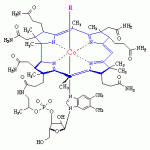Vitamin B12 Revisited

In recent reading about various vitamins, I became aware of some confusion about the source of Vitamin B12. Some web sites claim that plants are a good source of B12. Other sites say that B12 comes from animals. Yet other sites say that it comes from the soil. With all that going on, it’s little wonder that people are confused.
So, Where Does Vitamin B12 Come From Anyway?
I’m glad you asked.
Vitamin B12 is produced by simple organisms, such as bacteria and algae. The vitamin finds its way into the food chain by animals eating foods covered in or containing these bacteria and other B12-producing organisms. From there, microbial synthesis takes place in the animal’s digestive tract. The B12 is passed on through the intestinal lining and into the meat and organs of the animal.
Unfortunately for vegans, there are no plant-based sources of this crucial vitamin. There are plant-based Vitamin B12 analogues, but these analogues are not in a form that is usable by the human body. This is why it is absolutely essential that strict vegetarians and vegans take a B12 supplement. Without taking in animal protein in their diet, there really isn’t any other way of getting it than supplements.
Nutritional yeast is, by all means, a great source of B-complex vitamins, but B12 is not one of them. In the preparation of nutritional yeast that offers Vitamin B12, the vitamin is cultured independently and then added to the yeast for packaging.
Vitamin B12 plays a role in the metabolism of all cells in the body. especially with regard to DNA synthesis and regulation. It is crucial to healthy cell function and deficiency is a serious concern. Vegans who do not take B12 supplements may actually test as having normal levels in cases where they eat spirulina or certain algae. These organisms contain so-called pseudo-B12, which are active in tests for B12, but have no associated Vitamin B12 biological activity in the human body. Without supplementation or ingesting B12-producing bacteria, vegetarians and vegans are at serious risk.
Vitamin B12 provides such primary functions as essential growth factor; formation of blood cells and nerve sheaths; regeneration of folic acid; intermediary-metabolism co-enzyme function, especially in the cells of nervous tissue. Our modern-day lifestyle can get in the way of us being able to absorb and retain this vitamin. Alcohol is a serious problem in this regard, as are various other drugs, including oral contraceptives. Of note, pregnant women may test normally for B12 in tissue samples, yet their blood-serum level may be inadequate.
Deficiency leads to defective DNA synthesis, with is responsible for the growth and repair of our cells. Of significant concern is that chronic B12 deficiency leads to spinal chord degeneration. As well, DNA damage is an obvious risk factor for cancer.
Please ensure you get an adequate intake of animal protein in your diet. If you’re a vegetarian, taking a supplement is vital to your health and well-being.



April 4, 2014 at 12:16 am
Sparks
Hi, thanks for the info, it helped a bit.
I say a bit, because I’m still confused about the B-12 issue.
All of the info in this article seems to be true, or at least there is consensus about it, since the same info is replicated everywhere. But I start to wonder if it’s all hear-say or there is some solid foundation to the whole “vegan=B12 deficient” issue. There is solid evidence showing that some vegans are B12 deficient, while others do fine over decades and then there are studies showing that around 2 thirds of the population in meat devouring America are B12 deficient too. So it seems to be a complex issue that goes beyond the meat/vegetable dilema. Hopefully more studies will bring some light in the near future.
April 4, 2014 at 5:57 am
Trane Francks
Hi, Sparks.
Malnutrition is a tricky subject, as not everybody exhibits precisely the same symptoms over a period of time. I agree that there are long-term vegans who do well, but it’s been my experience there that those who do extremely well on a vegan diet also tend to take supplements. You’ll note that even The Vegan Society advises to take supplements and to eat Vitamin B-12-fortified foods. Anemia and nervous system damage are very real concerns. It’s my understanding that there is nothing hearsay about this issue.
A good number of North Americans show not just Vitamin B-12 deficiency despite eating meat, but also a broad range of malnutrition symptoms. This is despite the widespread incidence of obesity. The problem for a lot of people is that the quality of the foods they eat do not supply the nutrients they require. Eating a predominantly processed food diet sets one up for a variety of vitamin and mineral deficiencies. Ultimately, it’s important to choose high quality, unprocessed foods first and foremost. The next step is to vary the diet regularly to ensure that no trace minerals are missed and that our fatty acid profiles stay in balance.
At the end of the day, good health requires the triumvirate of whole foods, moderate exercise and the right amount of sleep at appropriate times of the day.
Thanks for dropping by! I’d be delighted were you to have more questions or comments.
Cheers,
trane
February 23, 2011 at 9:58 am
lynpeel
PS Lack of Vit B12 also helps give rises to Alzheimers …